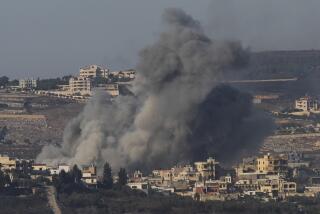Libya militias given deadline to disarm and leave Tripoli
- Share via
Reporting from Tripoli, Libya — Weary of continuing gunfire in the streets of the capital, Libya’s interim government has given notice to out-of-town militias to hand in their weapons and leave Tripoli in order to help steer the country toward civilian rule.
Militias have until Dec. 20 to leave, said Abdul-Rafik Bu Hajjar, head of the Tripoli municipal council, threatening to ban all traffic except vehicles from the Interior and Defense ministries if the militias fail to comply. His order has the backing of the new prime minister, Abdel-Rahim Keeb.
Rebel groups from across Libya stormed Tripoli in August, in a final, successful assault on longtime leader Moammar Kadafi. Having transformed government buildings and opulent homes of former Kadafi confidants into brigade “headquarters,” the militias now seem reluctant to depart.
Armed groups from the cities of Misurata and Zintan are among the most powerful remaining in the Libyan capital. As night falls, members have engaged in internecine feuds, gunfire and bombings.
There is major concern that the militias will become the muscle for political factions increasingly divided along Islamist and secular lines. Already, newly named secularist Defense Minister Osama Jueli has said he intends to keep a militia, particularly men from his hometown of Zintan, on the streets of the capital until a credible police force emerges.
“It’s the duty of the Ministry of Interior to establish security and establish a police force to take over from the revolutionaries who are in control,” he said. “These will not be withdrawn until a police force is established; to be sure, this is what I am aiming for.”
But the presence of the Zintan brigades and other militias is not welcomed by the Tripoli Military Council’s Qatar-backed Islamist leader, Abdel-Hakim Belhaj, who for months has armed and paid higher salaries to men he considers loyal to him, forming a private militia.
Scores of Tripoli residents Wednesday protested the continuing lawless behavior of remaining militias.
The attorney general of Libya’s new government said Wednesday that armed men had dragged him from his car in broad daylight in Tripoli and threatened his life if he didn’t free one of their friends from jail. Abdel-Aziz Hassady said he escaped only by snatching a gun from one of the attackers and pointing it at another’s head until he was able to get into a car and escape.
Recently, The Times has witnessed other rebels taking “justice” into their own hands. The men had captured suspected Kadafi loyalists and locked them in tunnels built below the home of one of Kadafi’s sons, Mutassim.
Speaking anonymously, a Tripoli telecommunications company employee said he was similarly detained after a street scuffle in which he broke a rebel fighter’s nose.
“They [a rebel gang] came to my house at night to take me away. There were a dozen cars and a pickup truck with an antiaircraft gun mounted on it,” he said. “They accused me of being a Kadafi supporter, and before I even started the court proceedings for breaking the man’s nose, they took me to their brigade house and kept me there for two weeks of interrogation.”
Personal relationships and feuds often take precedence over law books, the arrestee said.
“The brother of an ex-girlfriend was in the brigade that took me. He hates me. Every day he would come to my cell and promise I would never be released. They are working without a system, they don’t know what they do, there is no strategy, they are just collecting people. There are a lot of people arrested without trial.”
Shifting rebel militias from following the laws of war to those of civil society is proving a challenge. The role of the police, and indeed the court system, is being infringed by their presence. Judges are in some cases too frightened to do their jobs because armed brigades storm into prisons and take inmates by force.
The court system “can’t operate [properly] because of the weapons on the street.; we cannot force judges to work when there are so many weapons” and they stand such a high chance of attack, said former Deputy Justice Minister Abdulbaset Abumzirig.
Analysts say militias remain a strong presence in the eastern city of Benghazi, which served for a time as the revolutionaries’ de facto capital, as well as in Tripoli and other cities, as leaders seek to convert their military muscle into political power.
Critics say Fawzi Bukatif, a known Islamist who was supported by Qatar throughout the Libyan civil war, rose to become the head of the Rebel Union for the east of the country because of the well-armed militia under his command.
Bukatif is advocating the creation of a national guard to be made up of 40,000 former rebels. The group would protect borders and oil installations, he says, but would also be given privileges not afforded the armed forces, such as the right to engage in the country’s political system.
“The revolutionaries gave so much to this country, they have to be rewarded. Those that want to join the national guard will be able to be politically involved. Some were civilians, not soldiers, and they need to be given benefits,” Bukatif said.
Sherlock is a special correspondent. Times staff writer Alexandra Zavis in Beirut contributed to this report..
More to Read
Sign up for Essential California
The most important California stories and recommendations in your inbox every morning.
You may occasionally receive promotional content from the Los Angeles Times.













